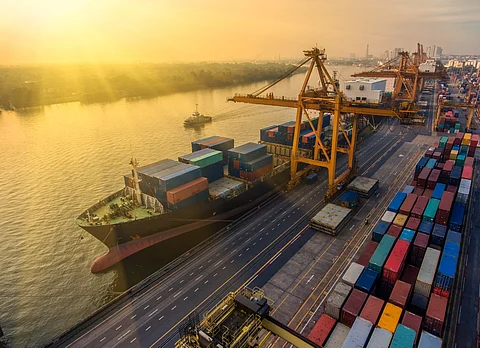

Environmental groups have urged the International Maritime Organization (IMO) to reject biofuels as a low-carbon solution for shipping, warning that their use would accelerate deforestation, land grabbing and climate change.
Biofuelwatch and the Global Forest Coalition (GFC), along with 65 other organisations, have sent an open letter to the IMO ahead of its upcoming discussions on a new low-carbon fuel standard. The letter highlighted the potential environmental and social harm of expanding biofuel use, particularly in the Global South and calls for stricter sustainability criteria.
A key concern is the role of the Brazilian government, which is advocating for biofuels in the shipping sector. The country is the world’s second-largest biofuel producer and has positioned itself as a leader in the market. Brazil will also host the next Conference of Parties (COP30) to the United Nations Framework Convention on Climate Change in November.
Campaigners, in a press release, argued that increased demand for biofuels will lead to further destruction of rainforests and agricultural land vital for food production.
“If the IMO was to endorse biofuels as a ‘low-carbon fuel’, it would lead to more rainforest destruction and land-grabbing while in fact accelerating climate change,” Almuth Ernsting of Biofuelwatch stated in the press note. “Communities in the Global South are already bearing the brunt of monoculture plantations—their expansion to feed further growth in biofuels would deepen the crisis.”
Maria Emília Pacheco, an advisor to the Brazilian NGO FASE, warned that diverting land to biofuel production could threaten food security. “Increasing biofuel production to meet the demand generated by the IMO would end up removing land essential for food production, in a context of hunger and a lack of any buffer in terms of stocks of basic food products in Brazil and other countries in the Global South,” she stated.
In 2023, the IMO committed to achieving Net Zero greenhouse gas emissions from shipping by around 2050. As part of this strategy, the organisation is developing a Global Fuel Standard (GFS) to encourage cleaner fuels. However, campaigners argued that allowing biofuels within this framework would undermine the IMO’s climate goals.
“Allowing the use of biofuels under the Global Fuel Standard would jeopardise the very goals the IMO seeks to achieve,” said Oli Munnion, GFC’s Forests and Climate Change Campaign Coordinator. “The design of the Global Fuel Standard should be based on stringent life cycle assessment guidelines that exclude the use of biofuels while protecting the climate, the environment and people’s livelihoods.”
The letter urges the IMO to focus on alternative solutions, including reducing shipping demand, improving energy efficiency and investing in advanced propulsion technologies such as wind-assisted propulsion and electrification.
The shipping sector accounts for approximately five per cent of global oil consumption, making it a lucrative market for biofuel producers. However, research suggests that the climate and environmental costs of biofuels often exceed those of fossil fuels when factors such as land-use change are considered.
Biofuels derived from crops like soy and palm oil are linked to deforestation, water pollution and food insecurity. Additionally, expanding biofuel plantations has disproportionately affected marginalised communities, particularly women, who lose access to land and essential resources.
Brazil’s biofuel industry has already had a significant impact on land use. By 2024, the country’s soybean cultivation covered an area equivalent to the size of Sweden. Similar trends have been observed in other biofuel-producing countries such as Indonesia, Malaysia, Argentina and Cameroon, where forests and farmland are increasingly being converted into biofuel plantations.
“The IMO’s decisions over the coming months will determine whether shipping’s future fuels drive sustainable progress or exacerbate global environmental and social crises,” said Souparna Lahiri, Senior Policy Advisor for Climate and Biodiversity at GFC. “The biofuel industry’s greenwashing cannot hide the destruction it leaves in its wake. The IMO must not trade one environmental disaster for another.”
As the IMO’s Marine Environment Protection Committee (MEPC 83) prepares to meet in April, campaigners stressed the urgency of excluding biofuels from the Global Fuel Standard. They argued that doing so would align the IMO with its climate commitments while safeguarding ecosystems and vulnerable communities.
“The shipping industry has an opportunity to lead with integrity,” Ernsting stated. “Real solutions exist that protect people and the planet. The IMO must choose these over false promises.”